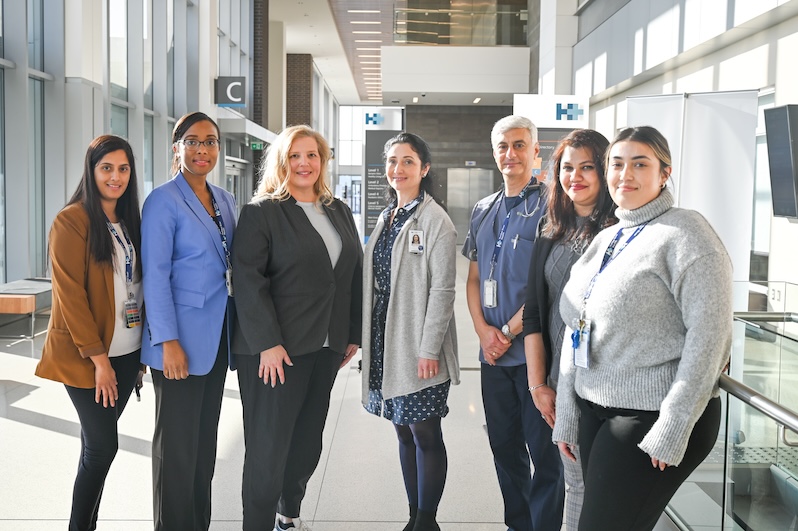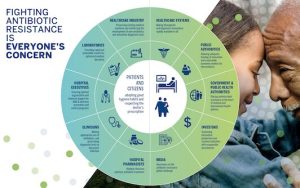How SCOPE is Improving Primary Care in NWT’s OHT

In January 2021, Humber River Health (Humber) launched a program aimed at solving one of the most persistent challenges in healthcare: administrative and logistical tasks that consume the time of Primary Care Providers (PCPs), including family physicians and nurse practitioners. SCOPE stands for Seamless Care Optimizing the Patient Experience and is designed to support PCPs by facilitating enhanced access to care pathways for patients and alleviating the burden of administrative tasks, such as finding the right specialists for referrals and coordinating diagnostic imaging.
As a member of the North Western Toronto (NWT) Ontario Health Team (OHT), Humber is part of a network that includes 258 family physicians and over 300 PCPs – individuals that SCOPE is specifically designed to help. Since its launch at Humber, SCOPE has grown to support over 200 PCPs in providing care for their patients, diverted over 300 Emergency Department (ED) visits, and continues to increase access to equitable care for our community.
Meeting the Needs of PCPs
SCOPE provides a web of support for PCPs through an interprofessional care team, all accessible through a single point of entry that is convenient for them – a phone call, fax, or email. When PCPs reach out to SCOPE, they can access nurse navigators, internists, outpatient services, diagnostic imaging, and home and community care services. These supports help coordinate care in a variety of pathways, including diagnostic imaging, mental health, neurology, fractures, plastic surgery, vascular, and lower limb
preservation.
As a member of the North Western Toronto (NWT) Ontario Health Team (OHT), Humber is part of a network that includes 258 family physicians and over 300 PCPs – individuals that SCOPE is specifically designed to help.
Each of the care pathways and how they are delivered was established in response to the insight and feedback of PCPs, and Humber has continued to seek ongoing input to ensure the program is developing and adding new pathways that effectively addresses their most pressing challenges. In doing so, SCOPE accelerates timelines for care by pairing PCPs with an expert in the healthcare system who can quickly and seamlessly arrange the care patients need. In fact, ninety percent of requests filed through the program are completed within a single day.
To-date, Humber’s SCOPE program has received over 2,500 calls from PCPs with each taking a mere five minutes (on average) to transfer the coordination of patient care. This enables PCPs to spend more time directly with patients, the ability to work more sustainable hours, and reduces administrative burnout – something that is being increasingly discussed in the media, medical journals and regulatory bodies as a problem needing a solution.
Family physician, Dr. Ferase Rammo, shares how SCOPE at Humber has impacted himself and his practice. “It has been a game-changer. Before SCOPE, wait times for specialists and other referrals were extremely long, which of course resulted in delays and frustrations for both patients and our team. With SCOPE, we have access to a five-star service that streamlines these steps, and impressively parallel-processes our requests. It is my go-to resource when I encounter complex patient presentations that require immediate attention. Patients have noticed the change in workflow and are very appreciative of the expedited services. SCOPE has fundamentally and permanently changed the way my practice is able to interact with our healthcare system.”
Reducing Avoidable Emergency Department Visits
SCOPE also plays a significantly role in reducing ED visits by being a conduit to timely care. Humber has one of the busiest EDs in Ontario, averaging 384 visits per day and roughly 90 per cent of patients not requiring admission.
Prior to SCOPE, PCPs in Humber’s catchment area struggled to access certain care pathways and supports, which ultimately increased avoidable visits as patients sought timely services through the ED. Now, more patient needs can be addressed through SCOPE.
The program also takes a holistic approach to educating and informing patients so that future ED visits can be avoided. By coordinating alternative care pathways for patients, SCOPE facilitates heightened awareness of available health resources, amplifies access to specific services like essential tests, imaging, or referrals, and even helps patients navigate different healthcare processes.
Increasing Access to Equitable Care
The informative approach and care facilitated by SCOPE increases access to equitable, team-based care and specialists. This is particularly important as Humber serves an equity-deserving community that continues to experience a lack of access to primary care and social support services. By supporting PCPs, SCOPE ensures that patients continue to get the care they need, when and where they need it. In response to these needs, SCOPE enhanced its Mental Health Pathway to include patient access to Mental Health Social Workers to provide short-term service navigation and information on available resources.
Fostering Collaboration in Healthcare
The positive impact of the program on PCPs and patients within our community is a result of collaboration among healthcare experts and would not be possible without Humber’s dedicated SCOPE team.
Beatrise Edelstein, Vice President of Post-Acute Care and Health System Partnerships at Humber led the implementation, and evaluation of SCOPE, and provides ongoing strategic leadership, advocacy, and stakeholder engagement to ensure its continued success. The program also benefits from the thoughtful and strategic management of Kathleen Kirk, and PCPs registered in SCOPE are supported by the expertise of our Nurse Navigators, Mehwish Ali and Kris-Ann Simpson.
The insight and direction of Dr. Patrick Safieh, Primary care SCOPE Lead and Dr. Andrew Duncan, General Internal Medicine SCOPE Lead, is imperative to the growth of the program. Dr. Safieh and Dr. Duncan integrate their personal experiences as physicians to ensure we are aligning the trajectory of SCOPE to the most pressing needs of physicians.
Together with the program’s governance inputs, including an Advisory Committee and the continual assessment and feedback of additional staff and physicians, Humber’s SCOPE team is making a profound difference in the lives of both PCPs and patients. This collaborative approach encourages interdisciplinary teams to actively participate in shaping patient care strategies, share insights, and contribute to continuous improvement. This engagement ensures that SCOPE remains a dynamic and evolving force in Humber’s care approach, fostering a culture of innovation and
excellence.
In the realm of healthcare, the power to expedite care is transformative, especially when it offers answers to patients during their most vulnerable moments. SCOPE is a testament to the power of collaboration in healthcare, and it’s helping Humber deliver innovative, safe, and equitable healthcare to every patient, every time.
Shahana Gaur is a communications specialist at Humber River Health.








